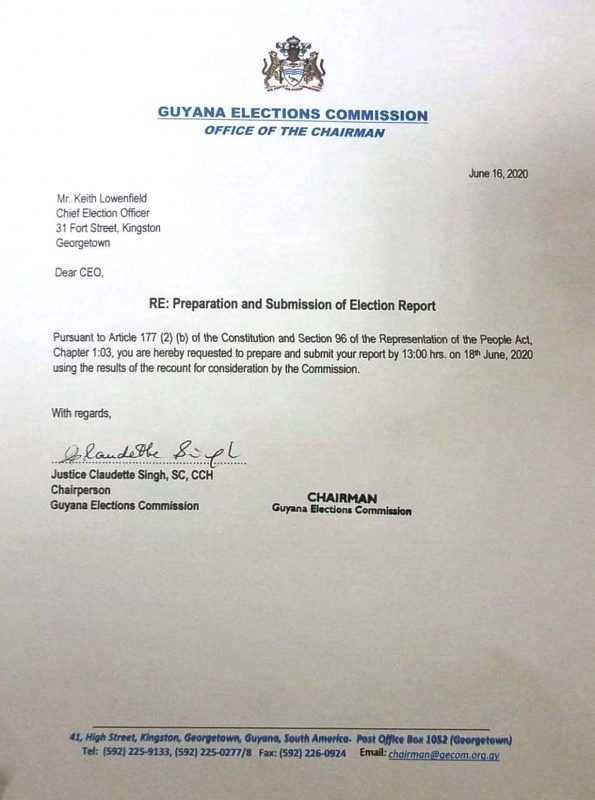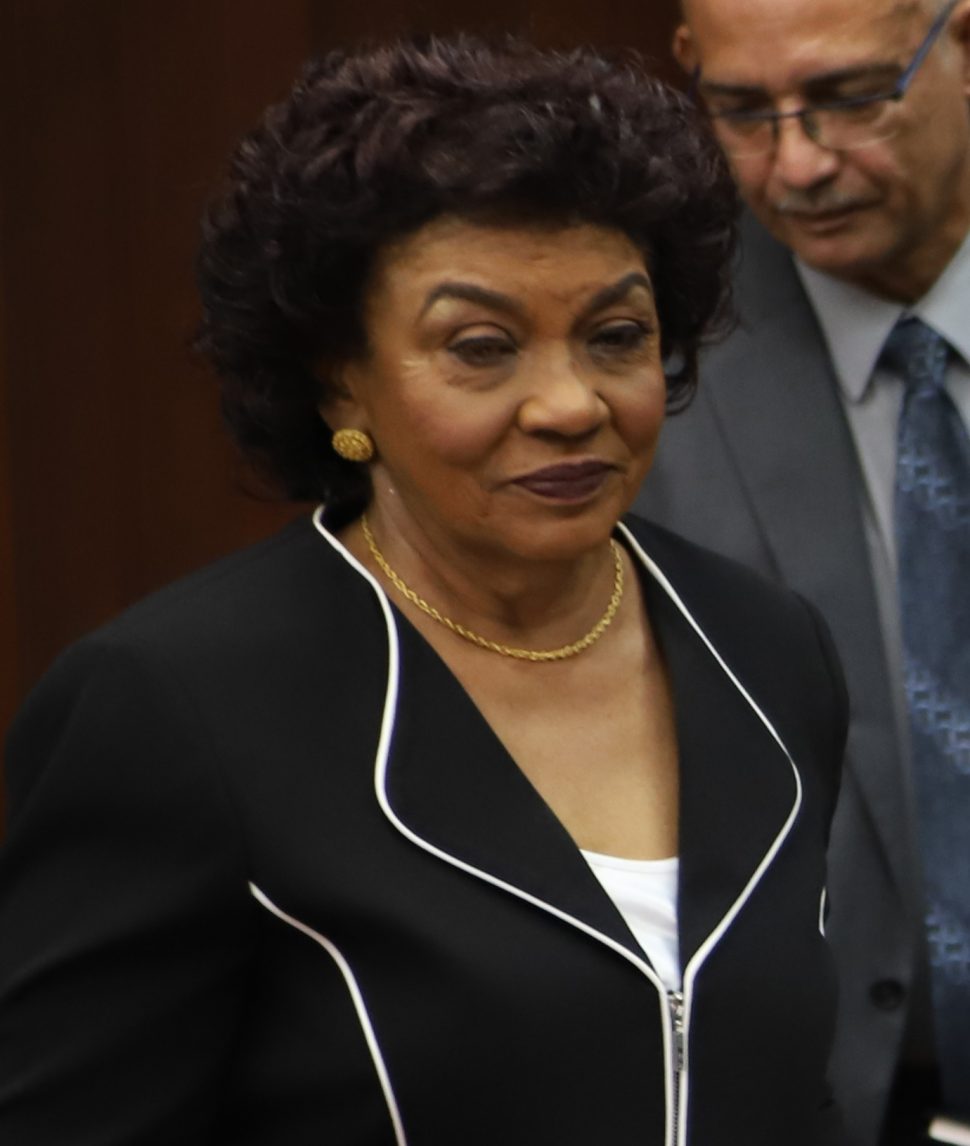More than three months after the March 2 polls, Guyana’s Chief Election Officer (CEO) Keith Lowenfield has been ordered to prepare a declaration of the results of the General and Regional Elections (GRE) using the data generated from the National Recount.
The Elections Commission has also directed that any questions about the validity of the GRE be submitted for judicial review via an elections petition. The decisions yesterday bring PPP/C presidential candidate Irfaan Ali closer to being sworn in as the new President of Guyana.
Up to press time there was no statement by caretaker President David Granger on the decisions by GECOM though he has routinely pledged to abide by any declaration by the Chair.

According to a letter sent by Chairperson of the Commission, Justice Claudette Singh to Lowenfield, he is to prepare and submit the report by 1 pm tomorrow using “the results of the recount”.
These results which were certified by GECOM’s Secretariat, show that the PPP/C’s list of candidates has secured 233,336 votes compared to the 217,920 garnered by the incumbent APNU+AFC coalition. This means the PPP/C has won the March 2 General Elections by 15,416 votes. Based on the figures, the PPP/C will have 33 seats in the new Parliament, the incumbent APNU+AFC, 31, and three parties: LJP, ANUG and TNM will share one seat in a list joinder.
Singh’s letter was dispatched following a meeting of the seven-member Commission at which the Chair supported a motion brought by the Opposition-nominated Commissioner Robeson Benn to finally have a declaration made.
In recent days, Singh has come under enormous pressure to declare a result and disregard appeals that she annul the March 2nd elections on the grounds of alleged irregularities un-earthed during the 33-day recount of ballot boxes. Observers had pointed out that she has no power to annul an election.
Under Section 96 of the Representation of the People Act, Chapter 1:03 and in keeping with Order No. 60 of 2020 which governed the recount, Lowenfield is to use the matrices for the recount of the 10 Electoral Districts to compile a report showing the number of votes cast for each list of candidates; the number of rejected ballot papers and the number of seats allocated to each list of candidates.
This means that Guyana could finally have a new government by the end of the week. Normally the CEO’s report is submitted within 24 hours of the tabulation of the final results and a declaration and swearing in ceremony is held within hours.
Opposition-nominated Commissioner Sase Gunraj explained to the media yesterday that in 2015 a declaration of Region 4 was done on Friday and by 12 on Saturday a meeting was called to consider the CEO’s report.
“That meeting lasted about 15 minutes and at about 2 pm that afternoon there was a swearing of the President. I expect the same alacrity,” he stated.
Gunraj, who supported the motion brought by Benn explained that in choosing to call for a declaration the chair rejected a request to have the elections annulled.
This request had been tabled by government-nominated Commissioner Vincent Alexander who argued that the “irregularities” unveiled during the recount were enough to invalidate the entire election.
Alexander’s argument was based on a summation of the observation reports compiled by Lowenfield.
Anomalies
In this summation, submitted with the results of the recount, Lowenfield argued that identified anomalies and instances of voter impersonation do not appear to satisfy the criteria of impartiality, fairness, and compliance with provisions of the Constitution and the Representation of the People Act.
“Consequently, on the basis of the votes counted and the information furnished from the recount, it cannot be ascertained that the results… meet the standard of fair and credible elections,” he concluded.
In line with the incumbent’s narrative that “fraudulent” votes should be removed from the tally, Lowenfield presented an alternative count for each District.
Across all ten districts the CEO suggested that only 185,260 votes cast can be considered valid. The verified figure from the National Recount is 460,295 votes.
Of the number of votes deemed valid, the majority was cast in favour of the incumbent as the alternative count grants the coalition 125,010 votes and the PPP/C 56,628.
The evidence used to deem nearly 60% of votes invalid includes breaches of polling procedures outlined in the Representation of the People Act and the official manual for Presiding Officers and other Polling Day Officials (Revised 2019) as well as alleged voter impersonation.
While Singh acknowledged in a GECOM press statement that some of the allegations are of a serious nature and must be addressed she concluded that the Commission does not have the power to do so.
The statement from the Commission explained that Singh maintained that GECOM does not have the powers of a Court of Law to examine and re-examine witnesses or to procure official documents to determine the truth of the allegations contained therein.
“Article 163 (1) (b) of the Constitution confers on the High Court the exclusive jurisdiction to determine the validity of an election,” she explained adding that though it resorted to Article 162 (1) (b) of the Constitution to give itself the authority to conduct the national recount, GECOM cannot clothe itself with jurisdiction to establish itself as a Court of Law to determine credibility of an election.
Justice Singh also noted that the Commission cannot arrogate onto itself a jurisdiction to annul an election since no specific power was conferred on it under Article 162 (1) (b).
“A perusal of Articles 162 and 163 of the Constitution shows that the Articles clearly and sharply separate the functions of GECOM and the High Court respectively in matters of electoral process,” the statement notes adding that Justice Singh reiterated that such matters are to be settled via elections petition.
Specific reference was made to a 1968 case, Gladys Petrie v. Attorney General in which the court interpreted Article 163(1)(b) then Article 71 (1)(b) of the 1996 Constitution.
The notes on this case explained the question which the court had to consider was “whether there is some general illegality either affecting the whole election or whether there has been some specific illegality being either an act or an omission which affects the results of an election.”
The Chair consequently reminded that Parliament has made provision for the determination of questioning the validity of elections by way of The National Assembly (Validity of Elections) Act Chapter 1:04 of which is “an Act to provide for the determination of questions relating to the validity of elections of members of the National Assembly under a system of Proportional Representation.”
This Act specifies that “any question referred to Article 163(1) (a), (b) and (c) of the Constitution may, in respect of an election…be referred to the court and shall thereupon be determined by it in accordance with the Act and every such reference shall be by petition.”
While voting and counting at the March 2nd elections were deemed to be fair and efficient, the tabulation process at the District Four office was marred by fraud when Returning Officer Clairmont Mingo was found to be using fictitious figures to give victory to APNU+AFC. This discovery triggered a series of legal cases culminating in the recount of all of the votes cast. This was done beginning May 6 at the Arthur Chung Conference Centre and lasted for 33 days. The Caricom observer team which had been monitoring the process issued their report on Monday and found that the recount and by extension the March 2nd voting provided a basis for the declaration of a final result.
Granger’s government has clung defiantly to power after losing the December 21 2018 motion of no confidence in parliament. It has been argued that senior persons within APNU+AFC were also aware of the elections result days after the March 2nd 2020 polls but refused to accept defeat. APNU+AFC initially called for Granger to be sworn in but after the recount began it changed its tune and began attacking the integrity of the election but presented no proof. None of the observer groups that monitored the elections found any evidence to substantiate the APNU+AFC claims. Moreover, no APNU+AFC polling agent complained about irregularities on March 2nd.
Parliament has not met for a more than a year, there is no budget in place for 2020 and the country is in the middle of the COVID-19 pandemic.






